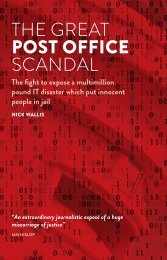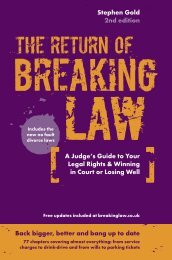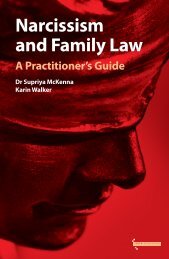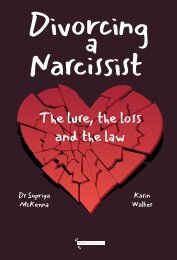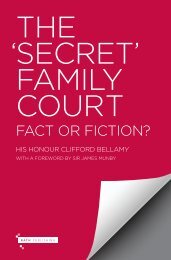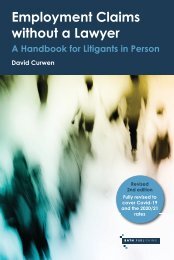Insolvency Made Clear: A Guide for Debtors
Plain English, practical guidance for anyone facing demands over a debt they are struggling to pay.
Plain English, practical guidance for anyone facing demands over a debt they are struggling to pay.
You also want an ePaper? Increase the reach of your titles
YUMPU automatically turns print PDFs into web optimized ePapers that Google loves.
Effect Of Bankruptcy<br />
2.16 Investigations by the Trustee in Bankruptcy<br />
A few days after the making of a bankruptcy order, the <strong>Insolvency</strong> Service will<br />
contact the bankrupt to organise an interview with their Trustee in Bankruptcy.<br />
From the bankrupt’s perspective, all the details of the bankruptcy are sorted out<br />
by the Trustee in Bankruptcy. Most of a Trustee’s time is spent understanding<br />
the assets and liabilities of the estate. They have powers under the Act which<br />
help them to do this.<br />
2.16.1 Investigation powers<br />
The bankrupt is under a duty to cooperate with the Trustee in Bankruptcy<br />
under s333 of the Act. This includes giving in<strong>for</strong>mation to the Trustee about his<br />
affairs, meeting the Trustee in person (‘attend on the Trustee’), and “do all such<br />
things as the Trustee may <strong>for</strong> the purpose of carrying out his functions reasonably<br />
require”. This includes giving in<strong>for</strong>mation about property acquired while still an<br />
undischarged bankrupt even after the bankruptcy has been discharged. Failure<br />
to cooperate with the Trustee without a reasonable excuse is contempt of court.<br />
At first, the Trustee will speak to the bankrupt in<strong>for</strong>mally, perhaps at the debtor’s<br />
home or at the office of the Trustee. If the Trustee is the Official Receiver (the<br />
‘OR’), they will usually require the bankrupt to fill in a ‘Bankruptcy Preliminary<br />
In<strong>for</strong>mation Questionnaire’ prior to the face to face interview. A copy of this<br />
<strong>for</strong>m can be found at https://www.nationalbailiffadvice.uk/img/PIQB.pdf. If the<br />
interviewee is unable to complete the questionnaire, <strong>for</strong> example, because they<br />
are unable to read, the Official Receiver will ensure that the <strong>for</strong>m is read to them.<br />
The Trustee will ask the bankrupt to set out all the property they are aware of,<br />
all their debts and the details of all major transactions undergone in the last few<br />
years. This will not be done under oath, but it remains a criminal offence to conceal<br />
property or to lie to the Trustee in Bankruptcy: see the full list of offences<br />
in Chapter 7. Without giving the full list of offences, it is generally the case that<br />
any scheme which the bankrupt may think of in order to avoid paying creditors<br />
(admitting a false debt; concealing in<strong>for</strong>mation; transferring property away in<br />
advance of bankruptcy; etc.) is a criminal offence.<br />
If the Trustee does not think this response is adequate, they can apply <strong>for</strong> a<br />
public or private examination of the bankrupt. This is a <strong>for</strong>mal hearing where<br />
the Trustee will ask the bankrupt questions under oath. It is substantially easier<br />
<strong>for</strong> the bankrupt and the Trustee not to use the examination process. In practice,<br />
it is only likely to happen when the Trustee suspects that the bankrupt is hiding<br />
something important.<br />
The court has discretion about whether or not to make the order <strong>for</strong> examination.<br />
However, unless it is wholly unreasonable, unnecessary or oppressive the<br />
35






